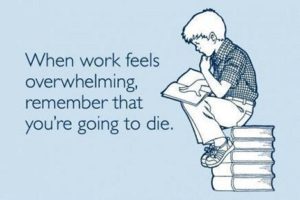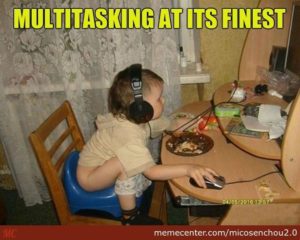With so many things happening in the world right now it can be easy to feel overwhelmed.
In case you don’t already know, being overwhelmed feels like you are being crushed, overrun, or overcome by something, in mind, body, or spirit.
The sensation of being overwhelmed can also feel very much akin to other high stress reactions such as anxiety, depression, or a bad case of the fuck-its.
In the Bergmann household we like to refer to the overwhelmed state of mind as ‘the swirling vortex of doom.’
It’s typically suggested that you can excise this particular demon by checking things off your to-do list (if you don’t know why writing shit down is important CLICK HERE), delegating/outsourcing tasks, or just plain fucking off and letting things fester, if that’s your thing.
But what if you’ve gone to great lengths to utilize some of these common tactics and still just can’t shake that lingering sensation of impending catastrophe? What if you keep finding yourself enraged over nonsensical and trivial things? What if you keep finding everything around you face meltingly irritating and impossible to manage?
Here’s the good news, quelling the swirling vortex of doom is relatively simple, everyone can do it, and doing it doesn’t require any additional equipment outside of using your big, beautiful brain.
Turns out, just like physical activity, effectively utilizing your brain’s superpowers requires practice, endurance, and headroom. And while some of us have been doing our best to condition our (summer) bodies during our respective quarantines let’s not forget about the ol’ noggin!
I know, I know. Thinking can be so cumbersome! And in today’s attention economy staying clear headed, avoiding distractions, and focusing on building more resilient and flexible thought processes can be an uphill battle, but let me try and make it a little easier for you.
Here are four quick things you can try out to exercise your mental fortitude and regain control of your runaway stress addled brain.
#1 Slow the fuck down.
Speed is the enemy of many things, and clear thinking is certainly one of them. Patience is seriously key during times of high stress and anxiety.
Remember, life is not a mathematical Olympiad. There are no medals for who makes life changing decisions the fastest. Rash and reactionary decisions are often the ones we regret the most, and having to correct a mistake or misunderstanding only eats up additional time that could be used for more productive pleasures or activities.
Give each thought the time it deserves by pausing everything else and honing in on it. Seriously, stop everything. Take a moment, breathe deeply and keep rolling that single thought around in your head. Repeat that thought like a mantra and notice how your constitution changes in relationship to that repetition.
#2 Stop multitasking.
One thing to consider is that you might be feeling tense and overwhelmed because of the sheer number of things you are trying to think about and/or trying to do at one time.
Turns out humans are pretty bad at multitasking. A decade long Standford University study showed that multitasking was a major driver for reduced information retention, a diminished ability to process memories, and inability to sustain a single point of focus. An article reporting on the the Stanford study notes:
“The researchers also found that people who are regularly bombarded with several streams of electronic information cannot pay attention, recall information, or switch from one job to another as well as those who complete one task at a time…”
“…frequent multitaskers performed worse because they had more trouble organizing their thoughts and filtering out irrelevant information, and they were slower at switching from one task to another.”
Multitasking basically results in more confusion and disorientation, especially when we lose track of the most important tasks at hand. And unfortunately the more you multitask the harder it is to break the habit. Donald Hebb, an early neuroscientist said it best: “Neurons that fire together, wire together.”
Not all is lost! You can break the multitasking cycle by simply trying to focus on one thought or task at a time without any other distractions.
Turn off the TV in the background, get off of social media, close any unused browser windows, pick up either the baby or frying pan, and get to work on ONE thing at a time.
Folks who get really good at single-tasking not only report better overall outcomes regarding the quality of their work but also an increase in the enjoyment of the process.
#3 Practice active listening.
Get out of your own head and actively listen to something, whether it’s a song, a podcast, or (heaven forbid) another human being. Active listening will help you build better relationships, solve problems more efficiently, ensure understanding, and improve accuracy.
Watch out for a few things: if you find yourself inserting your own opinions/likes/dislikes into an internal dialog, if you are trying to finish someone’s thoughts or sentences, or indulging your own fantasies you are no longer actively listening.
Again, active listening requires you to screen out ancillary distractions (like background noise and even your own drifting thoughts). After your active listening session is complete try and briefly summarize what just happened/what you heard/saw etc, or provide some type of nuanced observational feedback.
#4 Get in touch with your emotional barometer.
We often spend a lot of time and energy avoiding discomfort as opposed to dealing with it head on. Unsurprisingly this often leads to compulsive behaviors and distractions such as frequent internet browsing/shopping, rewatching the same TV show over and over again, or chronic rescheduling of appointments or social engagements.
This is a really good opportunity to investigate why you might be avoiding a particular person, place, thing, or scenario. Or why a particular Facebook post / conversation with a loved one / guy talking too loud on his cell phone at the grocery store made you have an outsized emotional reaction.
First of all, it’s ok to have these moments.
The problem arises when we do not ask ourselves why it happened and putter on as if doing nothing is going to prevent that from happening again in the future.
Don’t get stuck on the ferris wheel of “that’s just who I am”. Keep asking yourself “why” until you can’t ask the question any longer. What you find at the end of that road will probably be much simpler and easy to manage than you thought initially.
In closing…
These types of thinking exercises are especially important right now when tensions are high and there are many unknowns at play. In a time where new information and changes to our daily lives will present us with particularly challenging moments, we’ve been given a rare opportunity to exercise our capacity to “keep an open mind” and prove we are more than just our opinions and emotional reactions.
Oftentimes it will be the information that reaches you first that you will fight tooth and nail to uphold. However, we cannot only look to the past to help us shape the future. When we hold onto old ideas/ideals too tightly we weaponize our nostalgia and forget to think openly in a forward fashion.
But I promise, if you practice these four simple thought experiments, especially when you begin to feel overwhelmed with the world around you, you may notice that anxiety begin to fade away.
And finally, scientific evidence suggests physical exercise not only helps build cognitive power but also helps the brain resist shrinkage by promoting neurogenesis: the ability to adapt and grow new brain cells. So if and when you get tired of thinking, just pick up something heavy and throw it across the room for extra credit.










